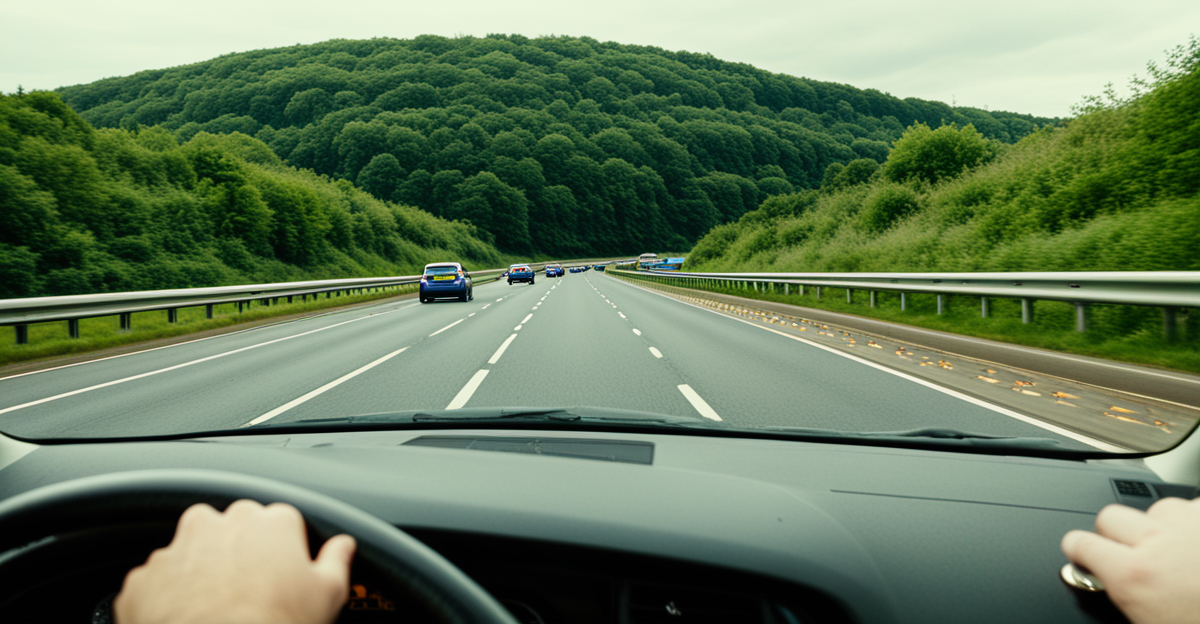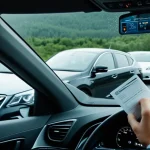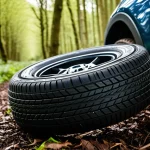Immediate Strategies to Stay Calm on UK Motorways
Finding effective road rage control techniques is essential to maintain safety and ease while driving on busy UK motorways. One of the fastest ways to achieve motorway stress relief is by practicing deep breathing. Taking slow, intentional breaths helps reduce heart rate and calms the nervous system, directly combating tension and frustration behind the wheel.
Mindfulness, or staying present in the moment without judgment, works alongside breathing to enhance emotion management. When drivers focus on their surroundings and sensations rather than reacting to provocations, they are less likely to escalate anger. This practice supports the goal to stay calm driving, even in heavy traffic or when faced with aggressive behavior from others.
Additional reading : Transform Your Classic UK Car’s Fuel System: Key Upgrades for Enhanced Performance
Another practical tool for road rage control is optimizing the in-car environment. Playing soothing music or familiar tunes can relax the mind, distract from stress triggers, and set a positive mood. Adjusting lighting, temperature, and seating comfort further promotes motorway stress relief, creating a controlled space that supports calmer driving habits.
Together, these techniques—deep breathing, mindfulness, and environmental adjustments—form a practical set of strategies for managing the common emotional pressures of UK motorway journeys.
Also to see : Maximize Your Vehicle’s Towing Capability: The Definitive Guide to UK Towing Regulations
Coping Mechanisms and Psychological Techniques for Drivers
Mastering coping with road rage involves more than just reacting calmly; it requires practical mental tools to manage intense emotions effectively. Cognitive-behavioural techniques help drivers identify angry thoughts early and reframe them, reducing the impulse to escalate conflicts. For example, if a driver feels cut off, recognising this as a temporary event rather than a personal attack promotes emotion management and helps them stay calm driving.
Progressive muscle relaxation is another powerful method. By systematically tensing and releasing muscle groups during stops or less demanding traffic conditions, drivers can alleviate physical tension that builds up with stress. Similarly, guided visualisation—imagining a peaceful scene or journey outcome—serves as a mental break, fostering motorway stress relief.
Self-awareness plays a critical role. Drivers who periodically check in with their emotional state and set clear intentions before entering motorways can better prepare for triggering situations. This proactive mindset reduces the risk of reactive aggression. Combining these psychological techniques creates a resilient framework for road rage control that supports safer, calmer motorway driving experiences.
Immediate Strategies to Stay Calm on UK Motorways
In high-pressure motorway situations, road rage control relies on quick relaxation techniques that can be employed instantly. Deep breathing remains one of the most effective methods. Taking slow, deliberate breaths lowers heart rate and activates the parasympathetic nervous system, promoting motorway stress relief. This physiological shift supports better emotion management, preventing impulsive reactions.
Mindfulness also plays a crucial role. By focusing on the present moment, drivers can detach from provoking stimuli and maintain clarity. This practice builds resilience against anger flare-ups and helps drivers stay calm driving even during prolonged traffic delays or aggressive encounters.
The in-car environment further influences mood and stress levels. Music with a steady, calming rhythm distracts from external frustrations, aiding in motorway stress relief. Adjusting settings such as comfortable seat position and suitable ventilation can reduce physical discomfort, which often exacerbates tension and impairs emotion management.
Together, these immediate strategies — deep breathing, mindfulness, and environmental tuning — form an effective toolkit for managing emotional tension and enhancing road rage control during challenging motorway drives.
Immediate Strategies to Stay Calm on UK Motorways
In moments of heightened stress on motorways, rapid road rage control is essential to prevent escalation. One of the fastest and most effective relaxation techniques involves deep, controlled breathing. This not only slows the heart rate but also triggers a calming response within the nervous system, fostering motorway stress relief almost immediately. Focusing on breath work encourages drivers to centre their attention, aiding in robust emotion management.
Mindfulness complements breathing by promoting an awareness of current sensations without judgement. When a driver practises mindfulness, they can detach from external frustrations or provocations, which helps them stay calm driving despite challenging traffic conditions or aggressive behaviour nearby. These techniques help interrupt the cycle of anger before it grows.
The in-car environment plays a notable role in emotional regulation. Soothing music with steady rhythms can ease tension and divert attention from stress triggers. Adjusting seat comfort, air circulation, and lighting settings also contribute to physical ease, supporting motorway stress relief. Overall, combining deep breathing, mindfulness, and tuning the inside of the car forms an immediate and practical approach to managing stress and maintaining composure on UK motorways.
Immediate Strategies to Stay Calm on UK Motorways
In stressful motorway moments, quick relaxation techniques are vital for effective road rage control. Deep breathing is one of the most reliable methods. By inhaling slowly through the nose and exhaling fully, drivers activate the parasympathetic nervous system, inducing motorway stress relief within seconds. This physiological response lowers heart rate and mitigates the fight-or-flight reaction, enhancing emotion management to help drivers stay calm driving during sudden provocations or traffic jams.
Mindfulness complements this by encouraging attention to the present experience without judgment. When drivers pause to observe their feelings and sensations, they create a mental buffer that lessens impulsive anger. Practising mindfulness repeatedly on motorways builds emotional resilience and facilitates sustained calmness, reinforcing road rage control especially in unpredictable UK traffic conditions.
Additionally, the in-car environment plays a key role in reducing tension. Listening to calming music with steady rhythms diverts focus from stressful stimuli, contributing to motorway stress relief. Adjusting seat position, air flow, and lighting to personal comfort further lowers physical discomfort, which often exacerbates frustration. Together, these strategies form a practical toolkit drivers can apply immediately to maintain composure and safety on UK motorways.
Immediate Strategies to Stay Calm on UK Motorways
When faced with sudden tensions on UK motorways, utilizing quick relaxation techniques is crucial for effective road rage control. The simplest and most accessible method is deep breathing. Taking slow, deliberate breaths calms the nervous system by activating the parasympathetic response, providing rapid motorway stress relief. Such physiological regulation improves emotion management, helping drivers to stay calm driving during unexpected provocations or congestion.
Mindfulness complements breathing by training drivers to focus fully on their senses and the present moment. This awareness interrupts automatic angry reactions, enabling more thoughtful responses and reducing the intensity of stressful feelings. Regular mindfulness practice cultivates greater emotional resilience, which supports sustained road rage control in challenging motorway conditions.
The in-car environment also influences tension levels. Listening to calming music with steady, moderate rhythms can divert attention away from triggers, fostering motorway stress relief. Adjusting seat comfort, ventilation, and lighting reduces physical discomfort that often worsens emotional strain. Together, combining breathing exercises, mindfulness, and environmental tuning offers a practical, immediate toolkit that drivers can employ anytime to maintain composure and safety on UK motorways.









